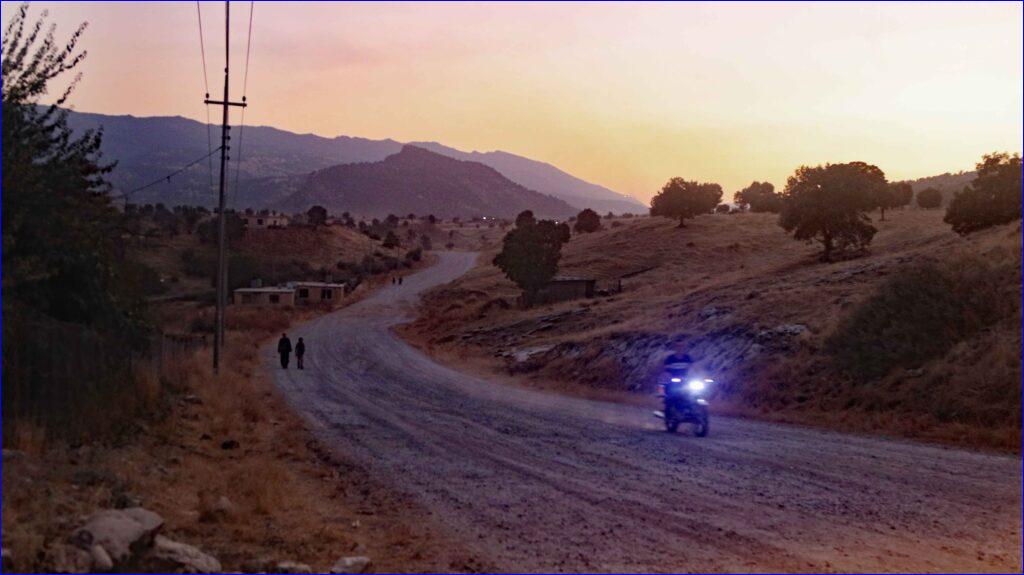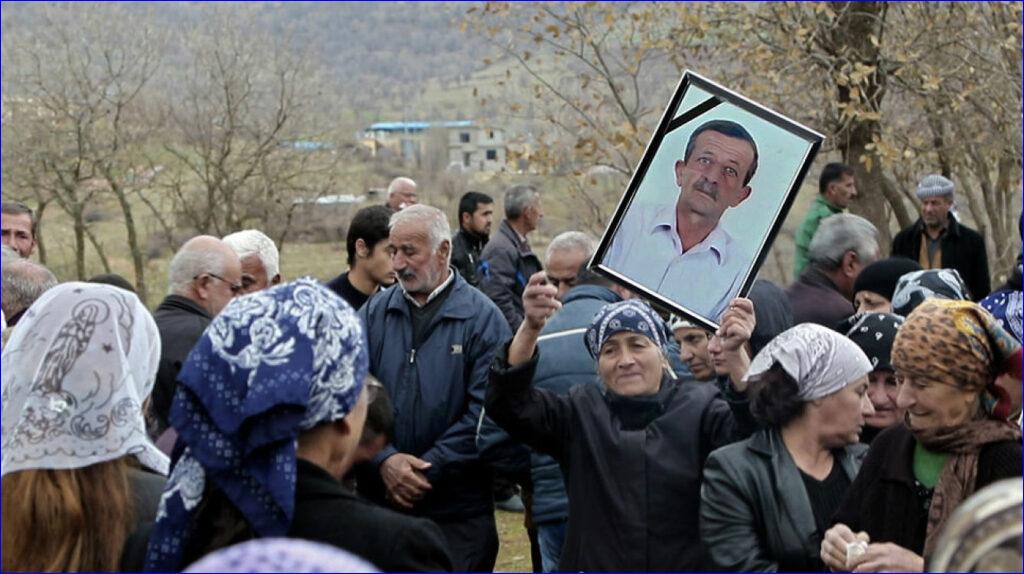


 Ferran Barber)
Ferran Barber)
"Surely Allah has a reason to bring you here," the mullah comforts me. "Now you will know what happens and the way they oppress us." He is a ruthless butcher but also an honest father and a gentle inmate. He gives you a glass of water while he tells you about his hatred for Al Maliki or explains why all Shiites should be killed.
The cell clock says it is August 8 and television parts suggest that the thermometers will reach 50 degrees out there. That night we will burn in the cell. The long march between rice paddies and sesame fields made the previous day under a zenith and merciless sun, between almost opaque clouds of mosquitoes, returns to my memory. I had almost collapsed as I trumpeted along the dirt track that connects the villages of the Assyrian valley of Nahla (near Dahok), the last stronghold of Iraqi Christians , one of those places in the Middle East where Jackals howl every night and everything wants to kill you.
I inevitably wonder what is the mistake I made by action or omission to end my trip to Iraq confined with 60 Daesh prisoners , suspected terrorists of Kurdish militias, renegade peshmergas , opponents of the Barzani regime, tramadol addicts, methamphetamine dealers and a handful of aristocratic thugs.
I must admit it. Just one week before I would have paid to sneak into this jail on condition that my stay had been a few hours, but damn it, it was not. I ended up hating every one of those seconds like eons I spent crammed in the prison. I remember myself being shipwrecked among thoughts dislocated by the lack of rest.
The prison where I am being held is one of the few prisons in the Third World where the tortured do not require torturers because their own living conditions impose worse mistreatment than any beating. Only two old and noisy vacuum cleaners air these cells; The atmosphere polluted by the thousands of cigarettes that inmates smoke compulsively is so poor in oxygen that in some places on the premises people collapse. Up to 12 hours we have to lie on the side, soaked in sweat and completely motionless. At least half of the inmates could not sleep at night. If you tried to do it during the day you could be hit by the cell's guardians.
Nothing to do; nowhere to go out of nostalgia for your life. Even so, I refuse to count the hours I have to spend deprived of my breath. I would end up waterlogged, like time. I prefer to focus on looking for some way out and I need to be sure that someone out there knows of my luck. I don't know what has brought me to jail. I ignore the weeks or months that I have to stay in it, but my perceptions acquire the appearance of a déjà vu because a couple of years before, I had written about the similar experience of three Spanish militiamen thrown into this filthy hole.
I even recognize the arrangement of the bars because I remember the sketch that Marcos Delil made after his release. We both made the same mistake: venturing to walk on a road in a troubled area.
I had traveled to Iraq the previous month hired by a German television producer to portray the lives of a handful of Spanish and German militiamen enlisted in a gerilla affiliated with the Kurdistan Workers Party (PKK) and based on the Yazidi region of Sinyar.
I did my job and, instead of continuing with them the trip to Rojava, I took some time in the Nahla Valley. Five days I spent in that Christian fief seeing old friends before receiving a call from northern Syria. I was offered to interview the family of a Spanish jihadist from the Daesh with whom no journalist had spoken. The offer was irreproachable. I knew it's the kind of story that would find a place in El Mundo.

 Ferran Barber)
Ferran Barber)
There were no taxis or vehicles in any of the villages. I decided to start walking with the hope of finding a car to reach the nearest town. There was a small inconvenience. That Christian/Assyrian region is occupied by the PKK, a Kurdish militia from Turkey with which the Peshmerga of Barzani (the soldiers of the GRK) are fratrically confronted. For the same reason, Turkish aviation does not hesitate to bomb civilian positions. I was a perfect target while trying to leave the valley behind. At the end of the afternoon, I accepted the offer of help from a peshmerga who came out to meet me.
"I can take you if you want to a taxi," he said, and although he was suspicious, I got into his old car. Where he actually took me is to the side of a road, where a vehicle broke in with three men equipped with assault weapons that identified themselves as border police. "We are the Government and the PKK people, a handful of terrorists," the officer greets me.
I spent that first night in a prison in Acre after being subjected to an interrogation parody. Neither they spoke English, nor did I understand Kurdish or Arabic. I was transferred from that town a day later to the Erbil Detention Center. When I was thrown inside the jail, I had no doubt that things could not be worse. Upon arrival, I shared the cell space assigned to me with 137 other prisoners. On the eve of my release, the prison record was broken. 160 inmates occupied a useful area of fifty square meters.
It is as if up to 12 individuals have to lie in a double bed. Or as if they forced you to sleep with two other people in the space of a coffin. The only possible way to spread on the ground is to lie on your side according to a protocol coordinated by the cell leader and his supervisors. " Oh, my God !", Repeated every night as a mantra a Kurd from Majmur. The PKK guy was more afraid of cell restrictions than the bombing of the Turks.
The basic protocol was as follows: your head in front of the feet of the accompanying prisoner and your chest, in contact with his legs. They force you every day to drink several glasses of a concoction of tea, sugar and 'Cafur' to prevent erections . The pressure that you endure and that at the same time you exert is so noticeable, that it is usual to have the body covered with bruises, rashes and abscesses.
The food is scum. Often, one spends half a day with a plate of white rice and some chickpeas. It is taken for granted that the officials who govern that prison remain for themselves the lion's share of the ten or 12 dollars granted by the Government of Iraq by prisoner and day. It is fair and necessary money to sustain the villas and the luxurious American vehicles of the tribal kleptocracy that props up the Barzanis mobsters.
A Kurdish boy from Sinyar burns his arm with a Korean menthol cigarette. "Did you ever see something like that?" He asks me. I shake my head. «You will leave soon. Inshala! Swear to me that you will not forget me . And I swear, again and again, as many as plead with Sajavi Ispani (Spanish journalist) to denounce that hell. The prisoners of the Asayish of Erbil dream of Guantanamo and Abu Ghraib while writing down their captive data on the role of Milano cigarettes: "Six years and four months in a cell of a hidden prison, a cubic meter of surface, and Two more here. I do not know what I am accused of, nor have I been told how long I will remain. Who speaks that way is a former commander of the peshmerga .
Exchanging kicks and elbows is often the only way to conserve your space overnight. It is a human and understandable reaction. Arriving in the morning, there are no accounts to settle. Also, if the cell gorillas discover you hitting someone, you are immediately punched in the face by your own partners. The rule may seem ruthless but it is useful to keep explosions of violence under control.
No differences are made with those of the Daesh. Imam Imad was one of the first inmates that I faced after my transfer to the Erbil prison, and one of my forced interlocutors, since he was one of the few prisoners who speak English fluently. One hundred and four times he had read the Koran
when I was admitted to the prison, and six more times, the day of my departure. Together with the rest of alleged members of the Daesh, he spends the day reciting suras. The Kurds also pray but out of despair and without the same discipline. The hell of these Arabs is much more provided with coal fire and promises of infinite pain.
Not even three days have passed since my arrival and I witness how they beat up an inmate . On the eve of my release, a well-known singer from Erbil goes to the infirmary to ask for a remedy for withdrawal symptoms. The two medical assistants and a third officer beat the artist with sticks until they crippled him on the ground.
There is nothing that can surprise me. I was handcuffed next to a Mosul doctor imprisoned at the airport when he was about to spend a few days on vacation in Turkey with his family. He was kidnapped like me because he had a name and surnames identical to those of a jihadist wanted by the Iraqis. In the Kurdistan of the Barzani, no evidence is needed to stop or torture someone. Kill them or imprison them all. Allah will already choose his own.
As I assumed, the Spanish Embassy had knowledge of my kidnapping by different means, and put the staff of its consulate in Erbil to work. My release, however, is delayed and Ambassador Hansi Escobar personally called the Kurdish Foreign Minister to confirm that I am a 'genuine journalist'.
Afterwards I learned that a small army of friends were out there beside me, mostly journalists familiar with the land, and responsible for the media with which I regularly collaborate. That is the best gift. Aided by their contacts, they beat Mesopotamia in search of some information that would clarify what happened. On September 4, I walked again through the streets of Ainkawa, the Christian neighborhood of Erbil, and a couple of days ago I returned to Barcelona from Cairo. Imprisoning a journalist is never a good idea.
Originally released by El Mundo Sunday Edition -- Crónica de El Mundo. This article was machine translated.

or register to post a comment.